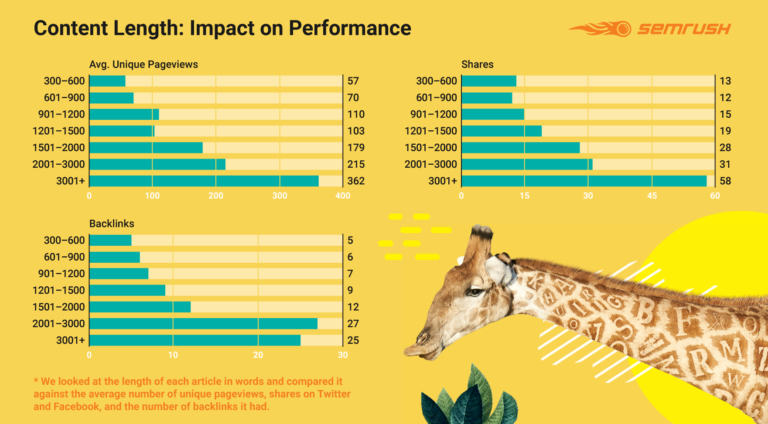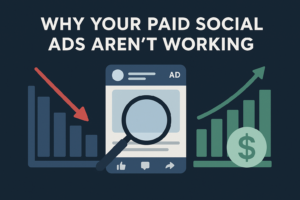Why Longer Content Is Smarter Content
According to a recent report from SEM Rush long form content (3000+ words) get 3x more traffic, 4x more shares, and 3.5x more backlinks than articles of average length (901-1200 words).
In a study of over 700,000 articles, the research shows that shorter articles (300-900 words) are 4.5X more likely NOT to be shared that long form content of 3000+ words.
Content Length: Impact On Performance

Key Takeaway:
In comparison with articles of average length (901-1200 words), long form content (more than 3000 words) has:
- 3x more traffic
- 4x more social shares
- 3-5x more backlinks
Shared Articles By Length

What is remarkable about this study is that 88% of articles over 3,000 words get share. While a shorter article (under 600 words) is shared less than half the time.
The data proves the hypothesis that people are more driven and engaged by blog posts containing more information. These studies have also shown that long form consistently outperforms short-form when it comes to shares:
- BuzzSumo: A BuzzSumo study investigated 100 million articles and found that posts with 3000-10,000 words performed the best when it came to shares. Posts with 1000 words or less received the least number of shares.
- Moz: A Moz study, in collaboration with BuzzSumo, also found that content with more than 1000 words earned more shares (and links) than content under 1000 words. This study looked at more than one million websites.
- HubSpot: A HubSpot study, which focused on the company’s 6000-plus blog posts, also found that longer content did better when it came to shares and links. They found that content with more than 2500 words did the best.
The most frequent objection we hear when we recommend to clients that their content marketing strategy needs to include more long form content is that nobody will read it. The data shows that a well written long-form article will not only be read, but it will be shared also.
Should I Never Write A Short Form Post?
These findings don’t mean you should avoid using short-form content at all. We want to make a crucial caveat here — content length should vary depending on the user’s intention in the first place and, secondly, on the type of content.
We would never make a blanket statement that you should never write short-form content. The following content topics may work well (and even better) as short-form content:
- Company announcements
- Annual industry trends
- Opinion pieces
Subjects that can’t meet the word count of long-form content, which is 1200 to 2000 words or more, should also get the short-form treatment. If you come across these topics, reassess their potential value to your company and your target audience.
FAQs about long-form vs. short-form content
What is long form content?
Long form content describes content with a 1200- to 2000-word count. This kind of content offers users more value because it takes an in-depth look at a topic, answering a user’s initial question and then their follow-up questions.
What is short-form content?
Short-form content describes content with less than 1000 words. This kind of content offers users a brief overview of a topic by answering their initial question and sometimes directing them to content that answers related questions.
What is the difference between long-form and short-form content?
Recent Posts

Paid Social Media ROAS
Why Your Paid Social Media Ads Aren’t Delivering ROAS—And How to Fix It You’ve invested in paid social media advertising. You’ve committed budget, time, and

Search Visibility
How to Improve Search Visibility and Drive More Organic Traffic For many businesses, low search visibility is a persistent challenge that directly impacts their ability

Generative Engine Optimization (GEO)
Generative Engine Optimization (GEO): The Future of Search and How It Differs from SEO As digital marketing continues to evolve, search is undergoing a radical

Best Practices for Building a Brand Presence on YouTube
Updated Best Practices for Building a Brand Presence on YouTube (2025) YouTube continues to be a dominant platform for video content, offering businesses unparalleled opportunities

Best Practices for Building a Brand Presence on Instagram
Best Practices for Building a Brand Presence on Instagram (2025) Instagram continues to dominate as a platform for visual storytelling, brand development, and audience engagement.

Social Media Strategies
10 Proven Social Media Strategies to Dominate in 2025 In the dynamic landscape of 2025, mastering social media requires a strategic approach tailored to evolving